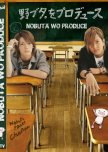‘ My Fair Lady’ Meets Japanese Idol Culture…
‘ Nobuta Wo Produce’ is a drama which has long had a love-hate relationship with J-drama fans; some loving the sweet and sentimental revamp tale of “shy girl” Nobuta (Horikita Maki) unlikely befriending
popular guys Kiritani Shuji (Kamenashi Kazuya) and Kusano Akira (Yamapi) in order to get a makeover and become popular, others seeing the drama as just cliche and prosaic. However this leaves newcomers who have stumbled across the drama with one question;” is ‘ Nobuta Wa Produce’ actually worth watching ?”
Arguably one of the winning strengths of the short drama is the acting front. Horitika Maki, Kamenashi Kazuha and of course Yamapi had brilliant and nuanced touches to their mannerisms as their onscreen personas and dynamic chemistry.
As far as the storyline goes there’s a mixed-bag of screenwriting techniques used. On a positive note the drama sometimes did present some more profound messages against its superficial setup; Nobuta’s “ makeover” didn’t press an immediate reset button on how other perceive her or her popularity ( as often showed in the “ magical makeover” trope), but rather gave others over the course of the drama the opportunity to understand the female lead’s unique personality traits.
Similarly unlikely popular main lead Shuji had his reflected insecurities over the course of the storyline. He was often scared of being rejected and often self-conscious about revealing his true self to others until he begins to open up around Nobuta and Akira.
As a consequence of the storyline focusing on high school a lot of the carried themes shown throughout the drama revolved around the “ high school experience” with certain poignancy in the reflected themes, personas and relationships of teens onscreen.
However whilst the drama undeniably had its highs during these moments in the first-half, the second-half lost the series’ true screenwriting momentum . The plot began to rest heavily upon poorly-executed tropes ( including the “ sabotage” cliche) in order to keep the plot moving rather than truly engaging the audience . Characters such as Akira( the fun loving “ jokester” character who felt as though he’d have his key moment to shine like Nobuta and Shuji), fell flat in seconds flat by having little development aside from plot “ tension” ( when it was called for) and to keep the storyline “ lighthearted”.
This is also pointed out a major problem with the second-half failing to seek a sense of dynamic build between our main characters’ friendship; the main goal being simply “ Nobuta’s makeover” lacked a lot of build and connection chemistry. Whilst this did improve over episodes ( and was sweet at times) , it still lacked an extra spark as a consequence of poor build-up.
Then of course there’s the dramatic shift with Shuji and Akira’s “ romantic feelings” for Nobuta. Whilst the romance was arguably necessary to “ spice up the drama”, it was prosaic and meaningless in a drama where the focal foundation of the setup is about friendship. Arguably whilst it was easy to see some connection between Nobuta and Shuji’s onscreen “ potential romance” due to their differing yet “complex” experiences, nothing was ever really solved or explored further between the two. (Questioning as to why it was put forward in the first place.) To add more fuel to the fire there’s also the issue of Akira’s “ crush” on Nobuta. Whilst it wouldn’t have been too bad if there had been a define explanation to Akira’s feelings or this had been carried further, it provided to never brought up again or carried over after its initial use.
The ending of ‘ Nobuta Wo Produce’ has undeniably left viewers indecisive. Admittedly whilst the show does give an appropriate finale and conclusion for Nobuta, there was little to really subside the drama from crumbling away from its initial foundations of a strong friendship between the main characters.
Overall ‘ Nobuta Wo Produce’ was not unwatchable. Despite false appearances against the “ outdated” idol-style haircuts and popular culture tropes, the acting front was fairly good here and the drama did presents some subtly powerful messages about adolescence. On the other hand a major proportion of the drama was overshadowed by the poor execution of the second-half with character arcs feeling rushed and unfinished and tropes and cliches often ruining more profound moments or messages. A decent binge-watch for anyone in the mood for a lighthearted series, but admittedly lacking more coherent structural writing and execution.
Vond je deze recentie nuttig?
























